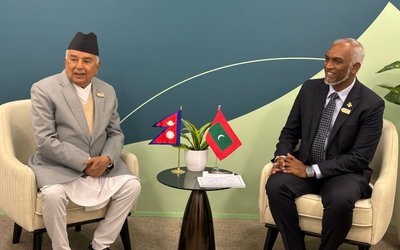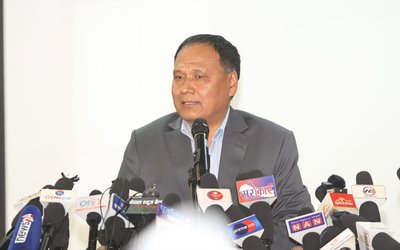
President of Clean Energy Nepal Bhushan Tuladhar emphasized the need for a well-maintained, and well-run public electric bus services which would help reduce air pollution, greenhouse gas emissions as well as congestion within the Valley.
Addressing the concluding forum of 54 participants representing the governmental agencies, non-governmental agencies, academia, transport entrepreneurs, urban/transport planners, research institutions and media, Tuladhar stressed the need to change current mode of urban transport based on fossil fuel.
Mangleswori Dhonju, Program Coordinator at CEN presented the findings of the baseline fuel economy study in Nepal. According to this study conducted by CEN , fuel efficiency and emission in the transport sector of Nepal is improving but LDVs account for only 8% of total vehicles and 78% of them are motorcycles which is a big challenge.
Prof. Dr. Amrit Man Nakarmi, technical expert and Center for Energy Studies at Institute of Engineering presented on Fiscal Policy Options Using Fuel Economy Policy Implementation Tool (FEPIT) in Nepal. He shared about emission rate from the transport sector in Nepal, the objectives of FEPIT, and the impact of new registration tax on fuel Economy and fiscal policy options. Bert Fabian, Program Officer of UNEP gave a global context of vehicle fuel economy and fiscal measures of LDV. He stressed on improving fuel economy to reduce CO2 emission, decarbonizing road transport to tackle climate change, fuel economy policy options and eco-labeling schemes adopted by different countries around the globe.
Dr. Thusitha Sugathapala, Senior Lecturer from the University of Moratowa, presented on regional experiences of fuel economy and fiscal policy measures in South Asia.
According to Dr. Sugathapala, "Transport is a complex matter and the growth of transport sector has translated into constant pressure for sustainability of development". He stressed on NDC commitments of South Asian Countries to reduce GHG target from transport sector.
The technical session was followed by a panel discussion among the audience and five panelists: Maniram Bhusal, Senior Divisional Engineer at the Ministry of Physical Infrastructure & Transport (MoPIT); Umesh Raj Shrestha, Chairman of Electric Vehicle Association of Nepal (EVAN); Indu Bikram Joshi, Deputy Director General at the Department of Environment; Sonika Manandhar, Founder of Aeloi and UN Environment’s 2019 Young Champion of the Earth; and Pradeep Amatya, Environmental Engineer at Lalitpur Metropolitan City.
It was moderated by Bhushan Tuladhar, Chairperson of CEN. Here these experts discussed the feasibility of various policy and plans to increase clean mobility options in the Valley.


Bhusal from MoPIT emphasized on the Ministry’s commitment to electric vehicles and the attempt of the federal government to increase intra-governmental cooperation between different provincial governments. Shrestha from EVAN acknowledged that there were policies to increase electric mobility but that these policies were rarely implemented. He also emphasized the need for different financing strategies for differently sized electric vehicles.
Amatya talked about the need for stakeholder consultation for building cycling lanes. Joshi from the Department of Environment said that eco-labeling was possible, however the push needed to come from the private sector and that it was also important to gauge the interest of the customers.
Manandhar of Aeloi, emphasized the option of utilizing the carbon offsets mechanisms to finance electric vehicles in Nepal. The forum concluded with closing remarks from
Organized by Clean Energy Nepal (CEN)/ Clean Air Network Nepal (CANN) in collaboration with the United Nations Environment Program (UNEP), experts highlighted the importance of electric urban transport to reduce the level of air pollution at the ‘8th Kathmandu Sustainable Urban Mobility Forum (KSUMF VIII).
KSUMF is an annual flagship event of CEN which started in 2011 that aims to bring stakeholders together to initiate policy dialogue and collaboration for sustainable urban mobility and better air quality. For this year, the discussions in the Forum revolved around the theme ‘Towards Efficient and Zero Emission Transport in Nepal’.
It aimed to share the baseline fuel economy of light-duty vehicles (LDVs) in Nepal and discuss possible fuel economy policies for the country. Furthermore, it aimed to discuss how electric mobility could enhance sustainable transport in Nepal. The technical session for the forum comprised of 4 presentations wherein the presenters discussed the emerging need to shift towards fuel efficient vehicles, fiscal policy measures globally and in South Asia and the need for clean transportation in Nepal.
- PM Oli Meets PM Modi In Thailand
- Apr 04, 2025
- I Bow to the People Who Have Given Me Justice: Kulman Ghising
- Apr 04, 2025
- U.S. Embassy’s Creator’s Mela 2025 Expands To Itahari And Pokhara, Empowering Nepal’s Digital Creators
- Apr 04, 2025
- Thai Investors Show Willingness For Investment
- Apr 04, 2025
- South Korea's Constitutional Court has upheld President Yoon Suk-yeol's impeachment
- Apr 04, 2025















